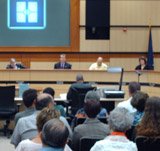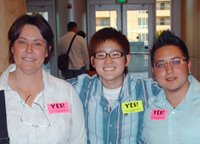Five Years Later Local Transgender Hate Crime Still Unsolved
Monday, August 28, 2006And Oregon isn't alone. In part because so few states include gender identity in hate crimes legislation, it is difficult to find accurate statistics on bias-based crimes against transgender people. The FBI does not even include such acts of violence in published hate crimes statistics. We do know, however, that hate crimes have increased in recent years and the bias against sexual-orientation is the motivating factor in nearly 16% of hate crimes.
Today, we remember Loni and hope for justice in this crime. To read more about Loni's story and the investigation, check out the coverage from today's Oregonian:

Washington County's only known hate killing unsolved 5 years later
Detectives and rights activists hope for a break in Lorenzo Igisaiar Okaruru's death
Monday, August 28, 2006
HOLLY DANKS
The Oregonian
HILLSBORO -- Five years after the savage killing of Lorenzo Igisaiar Okaruru, detectives remain saddened -- and stumped -- by Washington County's only known bias killing.
Okaruru, who was born male but lived as a woman under the name Loni Kai, was beaten on the head with a metal instrument and dumped in a field off Southwest Farmington and Rood Bridge roads early the morning of Aug. 26, 2001.
"We'd work around the clock to solve something this sad and this serious if we had the information available to us," said Roger Mussler, one of the original sheriff's detectives on the case.
Mussler retired in 2003 but was rehired a short time later to help investigate a promising tip from a prison inmate who wanted to trade information for a shorter sentence. Mussler and sheriff's Detective Murray Rau, a member of the county's Major Crimes Team, worked on the lead for several months.
They tracked down dozens of people and eventually found a car they thought may have been used to dump Okaruru's body. Forensics experts tore the car apart; Rau said they had to replace the seats, headliner and carpeting for the new owner.
"There would have been a lot of blood," said Detective Sgt. Mike O'Connell, another original investigator on the case.
But no trace evidence was found. The tip turned out to be bogus, Rau said.
O'Connell said the sheriff's office is so eager to solve the case that he'd bring Mussler out of retirement "tomorrow if we got another good tip."
The sheriff's office and rights groups are offering a reward of $4,000 for information leading to an arrest and conviction.
"Any crime of violence is important to remember," said Rachael Parker, a Forest Grove resident who is on the board of directors for Out and Equal, a national workplace advocacy group.
"Bringing closure to (Okaruru's murder) would be a wonderful thing for everybody," she said.
Parker, 37, said she was inspired to speak out on transgender issues when Okaruru was killed. "I knew that hate crimes against transgendered people happened, but until then, it was something that happened in New York," Parker said. "It became very real to me that it could have been me walking down the street."
O'Connell said Okaruru, 28, may have been killed by someone who thought he was picking up a woman and became enraged to find otherwise. Okaruru had reported being assaulted under similar circumstances less than a year before, O'Connell said.
At the time, detectives said Okaruru was beaten because he lived as a woman, making the killing the first homicide to be classified as a hate crime in Washington County.
Detectives said Okaruru, who was unemployed and lived with family in Aloha, was seen early that Sunday at the Golden Fountain lounge on Southwest Canyon Road and walking along Southwest Tualatin Valley Highway near Murray Road.
A neighbor found Okaruru's body in an overgrown field about four miles south of Hillsboro shortly before 8 a.m.
O'Connell says he thinks the killer called someone to help him dispose of the body after beating Okaruru elsewhere.
"Two people know about it, the killer and the person with him," O'Connell said. "And the odds are, based on human dynamics, other people know about it, too."
The more people who know about a crime, the more likely someone will come forward, O'Connell said. "Sometimes it takes somebody getting in trouble, getting jammed up," he said.
And sometimes all it takes to break an old case is jogging someone's memory, O'Connell said.
"We never give up hope that these are going to be solved," Rau said. "We never forget about them."




